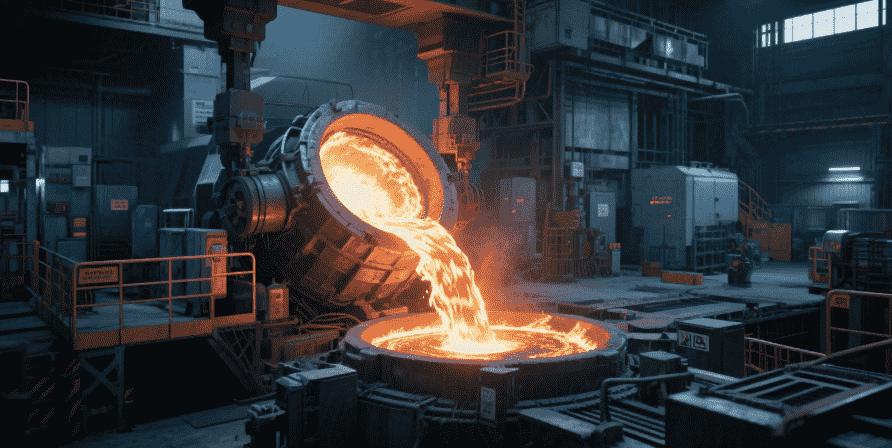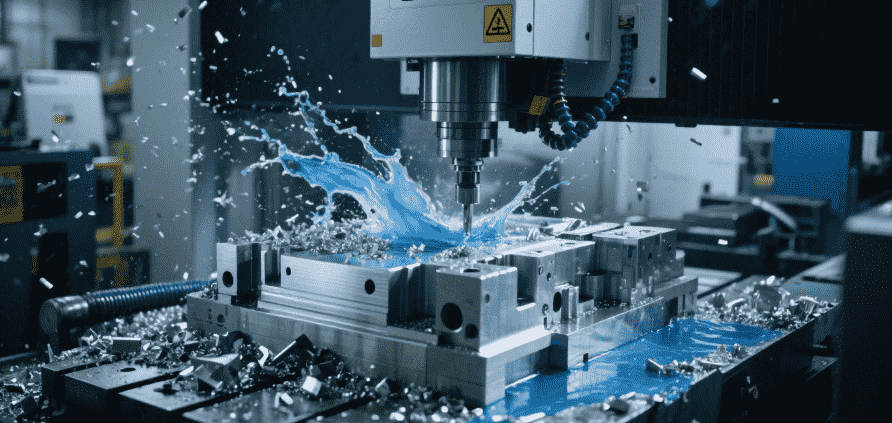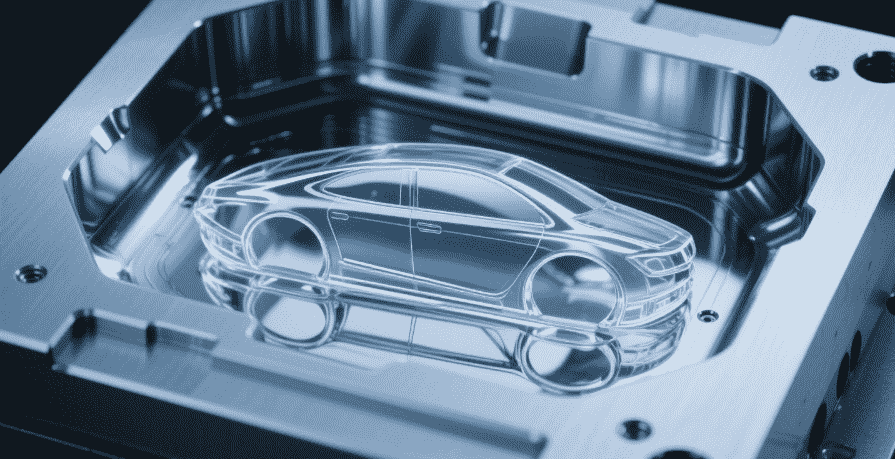Table of Contents
Introduction

In today’s highly competitive manufacturing landscape, industries such as automotive, medical devices, electronics, and consumer goods are constantly pushing the boundaries of precision, complexity, and aesthetics. At the heart of achieving these demanding requirements lies the injection mold – a critical component whose performance is directly influenced by the quality of its material and the precision of its manufacturing. For precision injection molds, the choice of steel is paramount, impacting everything from surface finish and dimensional stability to mold lifespan and overall production efficiency.
Among the top-tier choices for plastic mold steel, S136/NAK80 steel stands out. These specialized grades offer distinct advantages that cater to the exacting needs of modern mold makers and part manufacturers. However, even the best material can only reach its full potential when coupled with expert processing. This is where a reliable partner like Qilu Steel becomes indispensable. With over 30 years of steel industry experience, Qilu not only supplies high-quality S136/NAK80 steel but also provides comprehensive, high-precision processing services that elevate mold performance to new heights.
This article will delve into the unique properties of S136 steel and NAK80 steel, explain why they are the preferred materials for precision injection molds, and highlight how Qilu’s advanced manufacturing capabilities and processing accuracy are crucial in unlocking their full potential.
Understanding S136/NAK80 Steel: Core Properties for Precision Molds

The selection of mold steel is a strategic decision that directly influences the quality, durability, and cost-effectiveness of precision injection molds. S136/NAK80 steel are two prime examples of premium plastic mold steel grades, each with characteristics perfectly suited for high-performance applications.
S136 Steel: Corrosion Resistance and Polishing Ability
S136 steel, often known by its international designation 1.2083, is a high-chromium stainless mold steel renowned for its exceptional corrosion resistance and superior polishability. Its primary advantages for precision injection molds include:
• Outstanding Corrosion Resistance: The high chromium content in S136 steel provides excellent resistance to corrosion from aggressive plastics, PVC, and acids. This is particularly vital for molds used in medical devices, food packaging, and optical components, where product contamination and mold degradation must be minimized. It also ensures the mold maintains its pristine surface finish over prolonged use.
• Mirror-Like Polishability: Achieving a perfect surface finish on molded parts often begins with the mold cavity itself. S136 steel offers superb polishability, capable of achieving a mirror finish (down to A1 grade) that directly translates to the high-gloss aesthetic required for many consumer electronics and transparent parts. This property is critical for applications where surface quality is a key selling point.
• Good Dimensional Stability: After appropriate heat treatment, S136 steel exhibits excellent dimensional stability, ensuring that the mold retains its precise dimensions, which is crucial for producing parts with tight tolerances.
NAK80 Steel: Superior Machinability and Uniform Hardness
NAK80 steel, known as 1.2312, is a pre-hardened mold steel that offers a different set of advantages, primarily focusing on ease of manufacturing and consistent performance. Its key benefits for precision injection molds are:
• Exceptional Machinability: One of the most significant advantages of NAK80 steel is its excellent machinability in its pre-hardened state. This means mold makers can significantly reduce machining time and costs, especially for complex mold designs that involve intricate geometries, deep ribs, and fine textures. The ability to machine it easily minimizes tool wear and simplifies the manufacturing process.
• Uniform Hardness: NAK80 steel boasts remarkably uniform hardness throughout its section, even in large blocks. This consistency ensures predictable performance, minimizes warpage during machining, and guarantees that all areas of the mold will wear evenly, contributing to a longer mold lifespan and consistent part quality.
• Excellent Weldability and Texturing: Its composition allows for excellent weldability for repairs or modifications, and it accepts various surface treatments and texturing processes exceptionally well, offering design flexibility for textured components.
• High Polishing Capability: Similar to S136, NAK80 steel also offers very good polishability, making it suitable for applications requiring high-gloss surfaces.
Why Precision Matters: Challenges in Modern Injection Molding

The demand for ever-smaller, more complex, and flawlessly finished plastic components has amplified the need for extreme precision in mold manufacturing.
Addressing Dimensional Stability and Surface Finish
For industries like medical devices, even a micron’s deviation can render a part unusable. In automotive interiors, a subtle blemish on a high-gloss panel is unacceptable. Precision injection molds must consistently deliver parts with:
• Tight Tolerances: Maintaining dimensions within a few micrometers requires mold steel that exhibits minimal distortion during machining, heat treatment, and actual operation.
• Immaculate Surface Finish: Optical components, transparent housings, or high-end consumer electronics demand flawless, mirror-like surfaces directly replicated from the mold. This necessitates mold steels with superior polishability and resistance to surface degradation.
The Cost of Poor Material Selection and Processing
Choosing an inferior material or relying on imprecise processing can lead to a cascade of costly problems:
• Reduced Mold Lifespan: Premature wear, corrosion, or fatigue due to unsuitable steel or improper heat treatment leads to frequent mold repairs or replacements, impacting production schedules and profitability.
• High Scrap Rates: Parts failing to meet dimensional or surface quality specifications result in wasted material, energy, and labor.
• Extended Lead Times: Poor machinability extends mold manufacturing time, delaying product launches. Incorrect heat treatment can lead to rework or even mold scrapping.
• Compromised Product Quality: Ultimately, the quality of the mold dictates the quality of the final plastic part, directly affecting brand reputation and customer satisfaction.
This underscores why investing in high-quality S136/NAK80 steel and partnering with a provider like Qilu, which guarantees precise processing, is not merely an expense but a strategic imperative.
Qilu‘s Unmatched Expertise in S136/NAK80 Steel Solutions
At Qilu, we understand that supplying premium tool steel and mold steel is only half the equation. The other half involves ensuring that these materials are processed to exacting standards, unlocking their inherent potential for precision injection molds. Our comprehensive approach combines superior material quality with advanced processing services.
Here’s a comparative overview of S136 steel and NAK80 steel:
| Feature / Property | S136/1.2083 Steel | NAK80/1.2312 Steel |
| Main Advantage | Excellent Corrosion Resistance, Superior Polishability | Exceptional Machinability, Uniform Hardness |
| Typical Hardness (HRC) | ~29-35 (Pre-hardened, can be further hardened) | ~37-43 (Pre-hardened, typically no further hardening) |
| Corrosion Resistance | Very High (due to high chromium content) | Good (but lower than S136) |
| Polishability | Excellent (achieves mirror finish A1) | Excellent (achieves mirror finish A1) |
| Machinability | Good | Outstanding (reduces machining time and costs) |
| Dimensional Stability | Excellent (especially after proper heat treatment) | Excellent |
| Weldability | Good, but requires careful pre-heating and post-heating | Excellent (easy for repairs and modifications) |
| Common Applications | Transparent parts, optical lenses, medical devices, food packaging molds, molds for corrosive plastics | High-volume production molds, complex geometries, fine textures, electronic connectors, automotive interiors |
| Heat Treatment | Can be further hardened for increased wear resistance | Supplied pre-hardened, usually used as-is |
Advanced EAF & ESR Smelting for Superior Purity
The foundation of high-quality S136/NAK80 steel lies in its metallurgy. Qilu employs advanced Electric Arc Furnace (EAF) and Electro Slag Remelting (ESR) processes in our production. These sophisticated melting technologies are crucial for:
• Enhanced Purity: EAF and especially ESR significantly reduce impurities, inclusions, and segregation within the steel, leading to a much cleaner and more homogeneous microstructure. This purity is directly responsible for S136 steel‘s superior polishability and NAK80 steel‘s uniform hardness.
• Improved Isotropic Properties: ESR further ensures a highly uniform distribution of alloying elements, resulting in consistent properties in all directions – a critical factor for precision injection molds that experience multi-directional stresses.
• Superior Durability and Performance: The result is tool steel and die steel that are “carefully forged to ensure excellent durability, cutting performance and heat treatment stability”, which directly benefits the lifespan and performance of your molds.
Comprehensive Processing Services: Cutting, Machining, Heating, Forging, Heat Treatment
Beyond supplying premium raw materials, Qilu offers a full spectrum of processing services designed to optimize your mold manufacturing workflow. Our in-house capabilities include:
• Cutting And Machining: Utilizing reliable, advanced production equipment, we provide precise cutting and machining services for S136/NAK80 steel. This ensures that the material is delivered to your exact specifications, reducing your material preparation time and waste. Our precision machining capabilities are essential for initial mold blank preparation.
• Heating And Forging: Our expertise in heating and forging plays a vital role in shaping the steel and refining its grain structure. This process is meticulously controlled to enhance the mechanical properties of the steel, ensuring optimal strength and toughness for the demanding conditions of injection molding.
• Heat Treatment: Qilu offers specialized heat treatment services tailored for various tool steels and mold steels, including S136 steel. Proper heat treatment is paramount for developing the desired hardness, wear resistance, and dimensional stability of the mold steel. Our professional technical team possesses a deep understanding of the intricate heat treatment protocols for each grade, ensuring that your S136/NAK80 steel reaches its peak performance. This control over heat treatment is particularly critical for S136 steel to achieve its maximum corrosion resistance and hardness, while for NAK80 steel, it ensures that the pre-hardened state is maintained without compromising its excellent machinability.
Precision Tolerance Control: A Qilu Standard
For precision injection molds, tight tolerance control during every stage of processing is non-negotiable. Qilu’s investment in reliable equipment and a professional technical team ensures that we consistently achieve the highest standards of precision. Whether it’s saw cutting, milling, or grinding, our processes are meticulously monitored to deliver materials that meet or exceed the most stringent dimensional requirements, directly contributing to the flawless functionality of your molds. This commitment to precision helps “achieve perfect tolerance control in your steel parts”.
Customized Solutions & R&D Support
Every project is unique, and standard solutions often fall short. Qilu excels in providing professional customization services. Our team of experts, with extensive experience in the steel industry, works closely with clients to understand their “intended use, production process, required strength and budget”. We not only recommend the best S136/NAK80 steel solutions but also “assist customers in research and development”, helping them navigate complex material challenges and optimize their production processes.
Real-World Applications and Success Stories

The performance advantages of S136/NAK80 steel, combined with Qilu’s processing accuracy, have led to numerous successful applications across diverse industries.
Automotive Sector: High-Gloss Interior Components
A leading automotive manufacturer approached Qilu for S136 steel to produce molds for high-gloss interior trim components, such as dashboard bezels and center console parts. These components demanded an impeccable, scratch-resistant surface finish and consistent aesthetic appeal. By leveraging Qilu’s ESR-quality S136 steel and precision machining and polishing guidance, the customer achieved molds capable of producing parts with a superior mirror finish, significantly reducing post-molding secondary operations and enhancing the perceived quality of their vehicles. The S136 steel‘s inherent corrosion resistance also protected the molds from aggressive plastic additives, ensuring longer runs between maintenance.
Medical Devices: Strict Surface Finish and Durability
For a company specializing in disposable medical devices, producing millions of small, intricate plastic parts with strict biocompatibility and surface finish requirements was a challenge. They chose S136 steel for its excellent corrosion resistance against sterilization chemicals and its ability to achieve an ultra-smooth surface for optimal fluid flow. Qilu supplied the S136 steel cut to precise dimensions and provided expert heat treatment advice to ensure optimal hardness and dimensional stability. This collaboration resulted in molds that consistently produced high-quality, compliant parts, dramatically extending mold life and ensuring reliable mass production.
Electronics: Miniaturization and Complex Geometries
An electronics giant required NAK80 steel for molds fabricating miniature connector housings and intricate internal components for next-generation smartphones. These parts demanded exceptionally tight tolerances and complex geometries, with very fine wall thicknesses. The excellent machinability of Qilu’s NAK80 steel in its pre-hardened state allowed the mold maker to mill these complex features with remarkable speed and accuracy, significantly cutting down lead times and tooling costs. The uniform hardness of NAK80 steel ensured consistent part ejection and minimal mold wear across millions of cycles, a critical factor for high-volume electronics manufacturing.
These examples demonstrate how the right material, coupled with expert processing from a reliable partner, translates directly into improved product quality, reduced manufacturing costs, and enhanced competitive advantage for B2B clients.
Choosing Qilu as Your Strategic Partner
Selecting the right tool steel and mold steel solution provider is a strategic decision that impacts your project’s success. Qilu Steel stands as a testament to reliability, quality, and expertise.
30+ Years of Industry Experience and Global Standards
Established in 1985, Qilu boasts 30+ years of steel industry experience. This extensive experience means our team has a “deep understanding of the characteristics and applications of various tool steels and die steels”. We are also “familiar with the standards of different countries”, ensuring that our products and services meet global quality benchmarks, whether you operate domestically or internationally.
Ample Stock and Fast Delivery
We understand that time is often of the essence. Qilu maintains ample product stock of common tool steel products like S136 steel and NAK80 steel. This robust inventory management system allows us to provide fast delivery time, ensuring that your projects stay on schedule and minimizing costly downtime.
Professional Technical Team and Reliable Equipment
Our commitment to superior quality is underpinned by our reliable equipment and professional technical team. From advanced melting furnaces to precision machining tools, our infrastructure is designed to deliver exceptional results. Our experts are not just suppliers; they are problem-solvers, ready to offer comprehensive solutions and support, from material selection to processing optimization.
Conclusion
For precision injection molds, the choice between S136 steel and NAK80 steel depends on the specific demands of your application – whether it’s the ultimate in corrosion resistance and polishability, or unmatched machinability and uniform hardness. What remains constant, however, is the critical need for a supplier who can provide both the highest quality material and the precision processing required to leverage its full potential.
Qilu Steel, with its decades of experience, advanced EAF/ESR metallurgy, comprehensive processing services, stringent tolerance control, and commitment to customized solutions, is your ideal partner in achieving manufacturing excellence. We empower our clients to produce precision injection molds that deliver superior parts, extend mold life, and optimize production efficiency.
FAQ
Q1: What is the primary difference between S136 steel and NAK80 steel for plastic molds? A1: The primary difference lies in their core strengths. S136 steel excels in corrosion resistance and offers superior polishability, making it ideal for molds used with corrosive plastics, transparent parts, or applications requiring mirror finishes. NAK80 steel, on the other hand, is known for its exceptional machinability in its pre-hardened state and uniform hardness, which significantly reduces machining time and costs, especially for complex mold geometries.
Q2: Why is Qilu’s processing accuracy important for these steels? A2: S136/NAK80 steel are high-performance materials, and their full potential for precision injection molds can only be realized through precise processing. Qilu’s advanced cutting, machining, and heat treatment services, combined with our reliable equipment and professional technical team, ensure strict tolerance control. This precision prevents material waste, reduces secondary operations, and guarantees that the finished mold component accurately reflects the design intent, leading to superior part quality and extended mold life.
Q3: Can Qilu provide customized sizes and forms of S136/NAK80 steel? A3: Yes, Qilu offers professional customization services. We can provide S136/NAK80 steel in various forms and cut to specific dimensions, including bars, blocks, or plates, based on your project requirements. Our experts will work with you to determine the optimal material dimensions and processing steps based on your “intended use, production process, required strength and budget”.
Q4: Does Qilu offer heat treatment services for S136 steel? A4: Yes, Qilu provides specialized heat treatment services. While NAK80 steel is supplied pre-hardened and typically used as-is, S136 steel often requires precise heat treatment to achieve its optimal hardness and wear resistance. Our professional technical team has the expertise to perform the correct heat treatment cycles for S136 steel, ensuring maximum performance and durability for your mold.
Do you have stringent requirements for the surface quality and service life of your precision injection molds? Qilu offers high-quality S136/NAK80 materials and high-precision processing services. Contact us today to get your solution.

If you enjoyed this blog on mechanical parts processing, don’t forget to join me on social media for more insights, updates, and community discussions.
📘 Facebook – Connect with me here
Let’s keep exploring, learning, and growing together. Thanks for reading, and see you in the next post! 🚀

